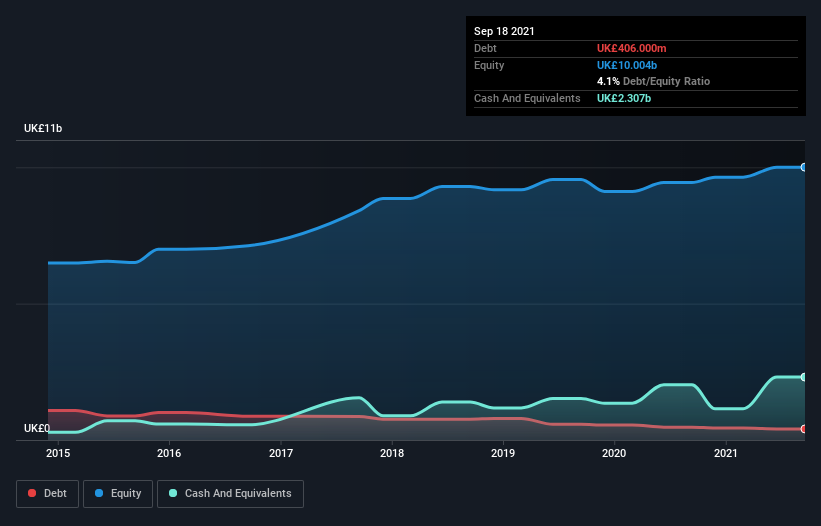Does Associated British Foods (LON:ABF) Have A Healthy Balance Sheet?
David Iben put it well when he said, 'Volatility is not a risk we care about. What we care about is avoiding the permanent loss of capital.' So it seems the smart money knows that debt - which is usually involved in bankruptcies - is a very important factor, when you assess how risky a company is. As with many other companies Associated British Foods plc (LON:ABF) makes use of debt. But the real question is whether this debt is making the company risky.
When Is Debt A Problem?
Generally speaking, debt only becomes a real problem when a company can't easily pay it off, either by raising capital or with its own cash flow. In the worst case scenario, a company can go bankrupt if it cannot pay its creditors. However, a more common (but still painful) scenario is that it has to raise new equity capital at a low price, thus permanently diluting shareholders. Of course, debt can be an important tool in businesses, particularly capital heavy businesses. When we think about a company's use of debt, we first look at cash and debt together.
View our latest analysis for Associated British Foods
What Is Associated British Foods's Debt?
You can click the graphic below for the historical numbers, but it shows that Associated British Foods had UK£406.0m of debt in September 2021, down from UK£472.0m, one year before. But it also has UK£2.31b in cash to offset that, meaning it has UK£1.90b net cash.
How Strong Is Associated British Foods' Balance Sheet?
According to the last reported balance sheet, Associated British Foods had liabilities of UK£3.28b due within 12 months, and liabilities of UK£3.61b due beyond 12 months. On the other hand, it had cash of UK£2.31b and UK£1.27b worth of receivables due within a year. So its liabilities outweigh the sum of its cash and (near-term) receivables by UK£3.31b.
While this might seem like a lot, it is not so bad since Associated British Foods has a huge market capitalization of UK£16.3b, and so it could probably strengthen its balance sheet by raising capital if it needed to. But we definitely want to keep our eyes open to indications that its debt is bringing too much risk. Despite its noteworthy liabilities, Associated British Foods boasts net cash, so it's fair to say it does not have a heavy debt load!
While Associated British Foods doesn't seem to have gained much on the EBIT line, at least earnings remain stable for now. When analysing debt levels, the balance sheet is the obvious place to start. But it is future earnings, more than anything, that will determine Associated British Foods's ability to maintain a healthy balance sheet going forward. So if you want to see what the professionals think, you might find this free report on analyst profit forecasts to be interesting.
Finally, a business needs free cash flow to pay off debt; accounting profits just don't cut it. While Associated British Foods has net cash on its balance sheet, it's still worth taking a look at its ability to convert earnings before interest and tax (EBIT) to free cash flow, to help us understand how quickly it is building (or eroding) that cash balance. During the last three years, Associated British Foods generated free cash flow amounting to a very robust 87% of its EBIT, more than we'd expect. That puts it in a very strong position to pay down debt.
Summing up
Although Associated British Foods's balance sheet isn't particularly strong, due to the total liabilities, it is clearly positive to see that it has net cash of UK£1.90b. And it impressed us with free cash flow of UK£786m, being 87% of its EBIT. So we are not troubled with Associated British Foods's debt use. Of course, we wouldn't say no to the extra confidence that we'd gain if we knew that Associated British Foods insiders have been buying shares: if you're on the same wavelength, you can find out if insiders are buying by clicking this link.
If you're interested in investing in businesses that can grow profits without the burden of debt, then check out this free list of growing businesses that have net cash on the balance sheet.
This article by Simply Wall St is general in nature. We provide commentary based on historical data and analyst forecasts only using an unbiased methodology and our articles are not intended to be financial advice. It does not constitute a recommendation to buy or sell any stock, and does not take account of your objectives, or your financial situation. We aim to bring you long-term focused analysis driven by fundamental data. Note that our analysis may not factor in the latest price-sensitive company announcements or qualitative material. Simply Wall St has no position in any stocks mentioned.
Have feedback on this article? Concerned about the content? Get in touch with us directly. Alternatively, email editorial-team (at) simplywallst.com.

 Yahoo Finance
Yahoo Finance 
